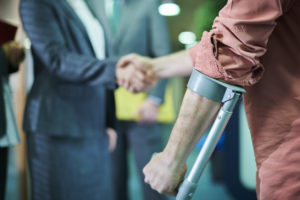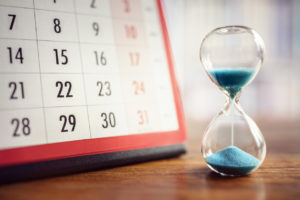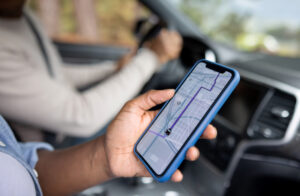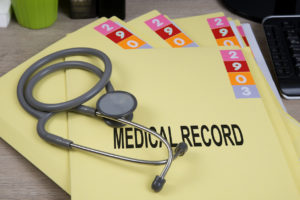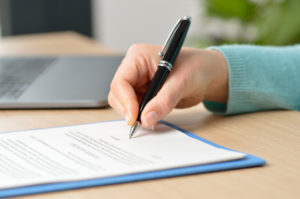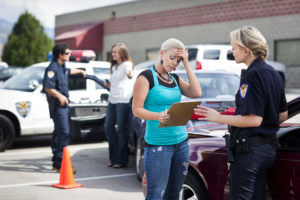Key Points:
- It’s important to talk to witnesses quickly after a car accident happens in Georgia. People start to forget details, so getting their stories soon is best.
- Witnesses might have to tell their story in two ways: they can either say it out loud while someone records it (this is called a deposition) or they can write it down and sign it (this is called an affidavit).
- If no one else stopped to talk to you or the police after the accident, you should call 911 and ask for the recordings of calls made about the accident. This can help find people who saw what happened.
Common Observers of Car Accidents: Who Usually Witnesses the Event?
To get statements from people who saw the car accident, you first need to figure out who might have seen it. Usually, there’s someone who saw the accident, unless it happened somewhere very remote. But, if you’re hurt at the accident spot, it’s more important to look after yourself and get help. This can make it hard to think about getting witness statements right away. Here’s a list of common people we usually find who were there when the accident happened:
- Other Drivers: This is one of the most common categories. Drivers nearby the accident are likely to witness what happened, either partially or in full. They can provide perspectives on the actions of the drivers involved, traffic conditions, and other relevant details.
- Passengers: People traveling in the vehicles involved in the accident, or in other nearby vehicles, can offer valuable insights. Their viewpoint might be limited to the interior of the vehicle they were in, but they can still provide important details about the events leading up to the accident.
- Pedestrians: Individuals walking near the accident scene can be crucial witnesses. They often have a clearer view of the incident since they are not confined inside a vehicle and might notice details that those in cars might miss.
- Cyclists or Motorcyclists: Like pedestrians, cyclists and motorcyclists often have a less obstructed view of the road and surroundings, making them potentially valuable witnesses.
- Local Residents or Business Owners: People living or working near the accident location might witness the event, especially if they were near windows or outside at the time.
- Public Transport Users: Passengers in buses or trams traveling near the accident scene can serve as witnesses. Their higher seating position might give them a different perspective of the event.
Who Does Not Qualify as a Car Accident Witness?
In car accident scenarios, not everyone who witnesses the event is deemed suitable for providing a witness statement. Primarily, drivers involved in the accident are usually not considered impartial witnesses due to their direct involvement and potential for biased viewpoints. Young children are often excluded as well, as their age might impact their ability to accurately observe and remember the incident. Similarly, individuals whose judgment might be impaired at the time of the accident, such as those under the influence of alcohol or drugs, are not typically relied upon for accurate testimony.
Additionally, people who may have mental health conditions affecting their perception or memory may not be considered reliable witnesses. Those who had a limited or obstructed view of the accident or were not fully attentive, like someone distracted by a phone call, might also provide less credible accounts. Friends or family members of the parties involved in the accident are subject to scrutiny for potential bias, although they are not automatically disqualified. Ultimately, the usefulness and credibility of a witness are assessed on a case-by-case basis by legal professionals, taking into account the specifics of each accident and the legal context.
What’s the Best Way to Find Witnesses if You Don’t See Any Right After a Car Accident?
If you don’t see any witnesses immediately after a car accident, there are still several ways you can try to find them:
- Check Nearby Businesses or Homes: Look for any businesses or homes near the accident site. People inside might have seen the accident, even if they weren’t outside at the time. Ask if they or their security cameras captured anything.
- Contact Local Businesses for Surveillance Footage: Many businesses have surveillance cameras that might have recorded the accident. Approach these businesses and ask if they can review their footage for any evidence of the accident.
- Look for Traffic or Security Cameras: Check if there are any traffic cameras, dashcams, or public security cameras that might have captured the accident. You can contact local traffic authorities or city councils to access this footage.
- Put Up Flyers in the Area: Create flyers with details of the accident and your contact
Are Witnesses of Car Accidents Generally Willing to Provide Their Testimonies?
The willingness of witnesses to provide testimonies in car accident cases can vary significantly based on several factors. In many instances, witnesses are cooperative and willing to share what they saw, understanding the importance of their account in determining the facts of the case. This willingness often stems from a sense of civic duty or a desire to help those affected by the accident. Witnesses may feel compelled to contribute to justice being served, especially in severe accidents where the clarification of events is crucial. However, the immediacy of the request, the perceived severity of the accident, and the witness’s personal beliefs about involvement in legal matters can influence their readiness to testify.
On the other hand, there are situations where witnesses may be hesitant or unwilling to come forward with their testimonies. Factors such as fear of legal repercussions, concerns about getting involved in a lengthy legal process, or worries about potential retaliation can deter witnesses. Additionally, if the witness is a friend or family member of one of the parties involved in the accident, they might have concerns about bias or conflict of interest. In some cases, witnesses may not feel confident in their recollection of the events or may worry about the accuracy of their testimony. It’s also possible for a witness to feel overwhelmed or stressed by the situation, especially if the accident was traumatic, leading to reluctance in participating in legal proceedings. Overall, the decision to provide testimony in a car accident case is a personal one and can be influenced by a myriad of individual factors and perceptions.
What Are the Key Questions to Inquire from a Witness at the Scene of a Car Accident?
If you’re a driver involved in a car accident and you’re speaking with a person who witnessed the event, there are several important questions you should ask to gather crucial information:
- Basic Identification: “Can I have your name and contact information?” This is essential for future reference or legal proceedings.
- Witness Position: “Where were you when the accident happened?” Understanding their location helps to assess the angle and perspective of what they saw.
- Accident Details: “Can you describe what you saw leading up to, during, and after the accident?” This helps reconstruct the sequence of events.
- Time and Environment: “What time did the accident occur and what were the weather and road conditions like?” These details can influence factors like visibility and vehicle behavior.
- Specific Actions: “Did you notice any specific actions from either driver before the collision?” This can include speed, signals, erratic driving, or distractions.
- Impact Description: “How did the vehicles collide?” Understanding the point and nature of impact can be crucial for insurance and legal purposes.
- Post-Accident Observations: “What happened immediately after the accident?” This includes the condition of drivers and passengers, reactions, and any statements made.
- Other Witnesses: “Did you see anyone else who might have witnessed the accident?” More witnesses can provide additional perspectives.
- Reporting: “Have you provided this information to the police or anyone else?” Knowing if their account has been officially recorded is important.
- Willingness to Assist: “Would you be willing to share this information with insurance companies or legal authorities if needed?” Their readiness to help can be crucial for any future claims or disputes.
What Is the Best Approach to Record the Testimony of a Car Accident Witness?
The best approach to capturing a testimony from someone who witnessed a car accident involves a few key steps. First, ensure that the witness is willing to provide their account. Approach them calmly and respectfully, and explain why their testimony is important. If they agree, start by gathering their basic information such as name and contact details. This is crucial for any future reference or follow-up.
Next, record their testimony in as much detail as possible. If feasible, use a smartphone or another recording device to capture their account verbatim; this helps in maintaining the accuracy of their statement. Ask them to describe what they saw and heard before, during, and after the accident, ensuring to cover aspects like the actions of the drivers, the impact, and the immediate aftermath. If recording isn’t possible, take detailed notes. It’s important to ask open-ended questions, allowing the witness to describe events in their own words without leading or suggesting details. After the witness has finished their account, thank them for their cooperation and reassure them that their contribution is valuable. Remember to keep the interaction professional and empathetic, acknowledging the potentially stressful nature of the situation for all involved.
Will the Police Officers Interview Witnesses and Document Their Testimony in the Police Report?
Yes, police officers typically interview witnesses at the scene of a car accident and document their testimonies in the official police report. When police arrive at an accident scene, one of their primary responsibilities is to gather as much information as possible to understand what occurred. This process includes speaking with drivers and passengers involved, as well as any bystanders or witnesses who saw the event unfold. Officers will ask witnesses to describe what they observed before, during, and after the collision. These accounts are crucial for piecing together an accurate and comprehensive picture of the incident.
The statements collected from witnesses are then usually included in the police report, a formal document that summarizes the incident. This report becomes a vital piece of evidence, often used by insurance companies and in legal proceedings related to the accident. It’s important to note that the level of detail and the format of these witness statements can vary depending on the police department’s policies and the specific circumstances of the accident. In some cases, witness testimonies might be summarized or paraphrased by the officer. Witnesses are also sometimes given a form to fill out, providing their account in writing. The thoroughness of this process plays a significant role in resolving disputes and claims arising from the accident.
How to Preserve the Statements from Witnesses of Your Car Accident
If you already have witness testimonies for your car accident written down or recorded, preserving them properly is crucial. Here are a few ideas to ensure their safekeeping:
- Digital Backup: For both written and recorded testimonies, create digital copies. Scan written statements or transfer audio/video recordings to a computer. Then, back them up on an external hard drive or a secure cloud storage service. This ensures that even if the original device is lost or damaged, you still have access to the information.
- Physical Copies: Make photocopies of written statements and store them in different locations. This could be at your home, in a safety deposit box, or with a trusted family member or friend. For recordings, consider burning them onto CDs or storing them on USB drives, and similarly distribute these copies.
- Secure Storage: Keep the original documents and any physical copies in a safe, dry place. A filing cabinet with a lock or a safe can protect these documents from accidental damage or loss.
- Update Your Legal Team: If you’re working with a lawyer, provide them with copies of all witness statements. They can keep these records as part of your case file, ensuring they’re available for legal proceedings.
Car Accident Witnesses Can Describe Other Important Facts That Can Increase a Settlement
Witnesses frequently observe more than just the accident itself; they often notice additional crucial details that can significantly contribute to a legal claim, such as:
- Observations Before or After the Accident: Look for signs of erratic driving behavior, such as a car weaving across lanes, indications of reckless driving, or a driver appearing to be under the influence, like staggering or displaying poor coordination.
- Sounds During the Accident: Pay attention to what was heard at the time of the collision. This could include the sound of screeching brakes, indicating an attempt to stop, or the absence of braking sounds suggesting a sudden impact, leading to either a frontal or rear-end collision.
- Sensory Details: Be aware of any distinct smells that might suggest impairment, such as the odor of alcohol or marijuana coming from a driver’s vehicle. This can be a crucial detail in determining the state of the drivers involved.
Witnesses are important for other reasons as well:
- Occupants of the Car: Witnesses can provide valuable information about the number of people in the car and their seating positions. This detail can be crucial in understanding the nature and extent of injuries sustained by the occupants.
- Identifying the Driver: In some cases, especially involving drunk or reckless driving, the actual driver might switch seats with a passenger before authorities arrive. Witnesses can help clarify who was really driving at the time of the accident.
- Local Knowledge of the Intersection: Witnesses who are familiar with the accident location, such as local residents, can offer insights into the frequency of accidents or near-misses at that particular intersection. This background information can be vital in establishing patterns of danger or negligence at the site.
- Observations in Hit and Run Incidents: In hit and run accidents, witnesses might be able to describe individuals they saw leaving the scene of the accident. Their descriptions can be essential in identifying and locating the responsible party.
Should You Hire a Private Investigator to Find and Interview Witnesses?
Hiring an Atlanta licensed private investigator can be a beneficial decision. Not only are they skilled in locating and interviewing witnesses, but the right investigator, if also a certified notary, can take sworn statements in the form of an affidavit. However, it’s important to remember that private investigators can be costly. Many personal injury and car accident lawyers have the resources to hire an investigator on your behalf, or they might use their office staff for investigative purposes, which can help in reducing your expenses. This is one of the advantages of engaging an experienced and well-resourced injury attorney.
Interviewing Witnesses Can Usually Prevent a Nasty Surprise Later in Your Case
In a car accident investigation, promptly interviewing witnesses is crucial, as memories can fade quickly. An experienced investigator should gather their statements soon after the accident, which can then be confirmed with the witnesses before they testify, ensuring they remember the details accurately. Witness statements are key, often complementing the police report by confirming or challenging its contents, and can reveal if the at-fault driver is being untruthful about the accident. Furthermore, any contradictions in these statements can lead to further investigation. Sometimes, these statements might prompt a reevaluation of the legal strategies available for a claim.

 1201 West Peachtree Street #2339 Atlanta, GA 30309+1-770-212-3795$0-$100000
1201 West Peachtree Street #2339 Atlanta, GA 30309+1-770-212-3795$0-$100000Your thoughtfulness in thinking about the teachers is appreciated. Thank you so much for the box of sharpened pencils!


